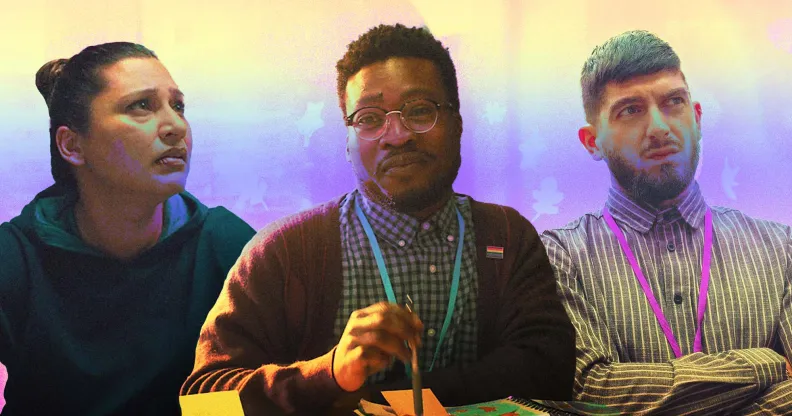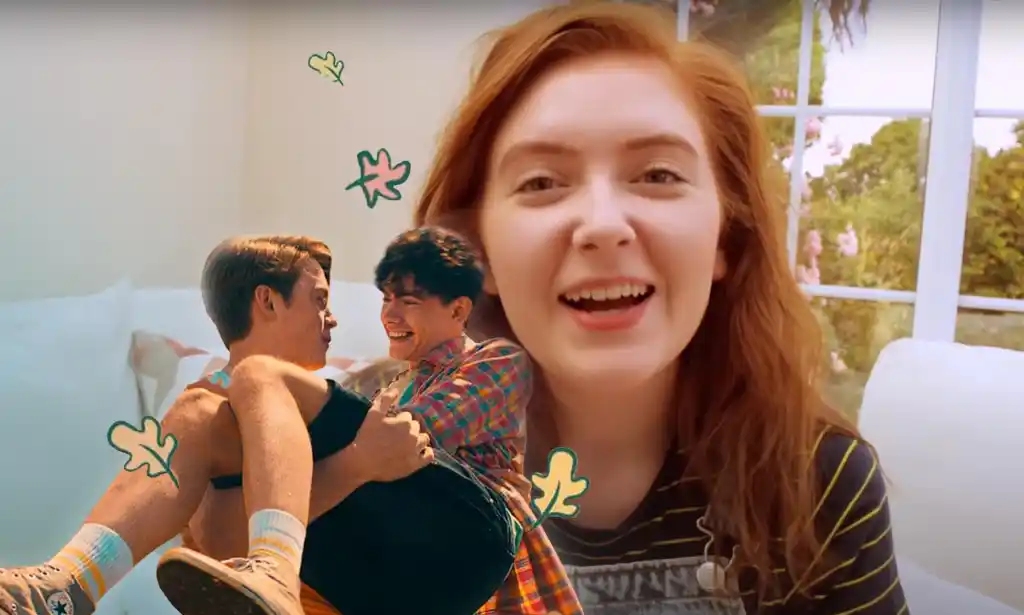Heartstopper season 2: Why queer teachers are the show’s most vital asset

Coach Singh, Mr Ajayi and Mr Farouk are Heartstopper’s guiding lights. (Netflix)
Charlie and Nick are embracing being boyfriends. Elle and Tao are giving their relationship a go. Darcy and Tara are gearing up to say the big “L” word (“love”, not lesbians).
But while Heartstopper‘s core focus is on the queer students, in today’s political climate, the teachers feel equally as revolutionary.
In season one, we’d go as far as to say that Charlie’s best on-screen partnership was actually with Mr Ajayi. The queer art teacher was there to offer advice to his student and help guide him through his first queer romance – in addition to providing a (literal) safe space when needed.
Now, Heartstopper author Alice Oseman has upped the game.
Season two gives us a lot more of Nathan Ajayi and introduces us to the steely Mr Farouk, both of whom end up finding queer romances of their own (no spoilers here).

We’re also given one of the show’s most beautiful scenes between Nick and Coach Singh in episode three. “If any of the [other rugby] lads say anything out of line, you tell me immediately, all right,” she says after catching him kissing Charlie, before telling him about how she met her wife.
“I remember what it was like, telling all my friends,” she adds when he mentions coming out. “You don’t owe them that information.”
A teary-eyed Nick thanks her, and you can almost see the weight lift from his shoulders. It’s a small showcase of the positive connections that can be built between teachers and students when both are allowed to be exactly who they are.
For queer British audiences of a certain age, the scene is simultaneously heart-warming and painful. It’s a stark reminder of the type of vital support network that was cruelly ripped away from a generation of LGBTQ+ people under Margaret Thatcher’s grim Section 28.
In place from 1988 until – in most of the country – 2003, the law prohibited schools “promoting” homosexuality, which included teachers discussing their own sexuality, and prevented educators from supporting LGBTQ+ students in any way.
Queer teens were left with nowhere to turn, often leaving them with intense feelings of shame.
It didn’t magically end overnight, either: muddled guidance led to many teachers not knowing whether they could discuss LGBTQ+ issues even after the law was removed from the statute books, while it homophobic legacy was felt in school hallways for years.
Even as a student who attended secondary school in the late Noughties, I would routinely see teachers berated for being queer, even if they were only assumed to be, while some of their colleagues flaunted homophobic attitudes overtly.
It’s something about which 28-year-old Oseman has personal experience. “The concept of queer teens being able to reach out to queer teachers for guidance and advice feels almost utopian, even to someone of my age, who was still in school a mere decade ago,” she said recently. “Seeing queer teachers on screen, with that history in mind, is radical.”
The safe and comforting classrooms of Heartstopper just didn’t exist in recent history. The sad thing, though, is that they often still don’t.
In the UK, the Conservative government are expected to introduce legislation that could effectively force teachers to out trans pupils to their parents, in a move some activists have dubbed Section 28 by stealth.

Plus, according to UK LGBTQ+ young people’s charity Just Like Us, queer teachers are far more impactful as role models than out celebrities – yet 60 per cent of young adults don’t have those vital, real world influences.
“As a former teacher myself, choosing to be open about being LGBT+ in my school community was one of the most important decisions of my career,” says Laura Mackay, the charity’s chief executive.
“Openly LGBT+ teachers are able to help their LGBT+ pupils feel safe and supported, as well as give them hope for the future. LGBT+ young people still face disproportionate challenges, from mental health struggles to bullying and abuse, but the power of seeing LGBT+ adults around them living successful and happy lives cannot be overstated.”
Meanwhile, in the US, Florida has introduced its Don’t Say Gay bill, which is Section 28 in all but name. Several other states, including Arkansas and Louisiana, have passed similar legislation, with other states working on getting a law passed.
Other bills in states across the country prevent trans students from using toilets or playing in sports that align with their gender identity.
Willie Edward Taylor Carver Jr, a queer educator who was named teacher of the year in the US state of Kentucky in 2022, knows first-hand the power of openly LGBTQ+ teachers.
“One of my students called my classroom a ‘brave space’ because the total lack of judgment made him feel that he could be himself. He learned freedom. I didn’t indoctrinate, quite the opposite,” Carver said.
Much like Heartstopper’s Coach Singh, Carver is open about his identity through stories and discussing his family.
“Many of my LGBTQ+ students have never seen a queer adult. I am a promise that they can make it to adulthood when many LGBTQ+ youth don’t.
“There are queer youth who would no longer exist if they didn’t have queer teachers to care about them.”
In a reflection on the dire state of affairs, Carver left the teaching profession last year owing to incessant anti-LGBTQ+ abuse from parents. The school’s administration, he said, refused to take action. Kentucky is one of the states that has passed legislation similar to Don’t Say Gay in recent months.
As is its purpose, Heartstopper exposes us to a world in which teachers are able to freely express and embrace their sexuality, and where they can offer solace to queer students navigating the start of their own identity journeys.
Far from the hard-line right-wing rhetoric that such support is dangerous or harmful, Heartstopper shows us that it’s essential. Such a world would see young people taught more than maths or geography: they’d learn that being who they are is absolutely OK.
In Heartstopper, the teachers are the real heroes, and the students thrive because of it. It’s sadly not the reality we’re living in right now, but the Netflix series shows us just how enriching school life could be if it was.
Season two of Heartstopper launches on Netflix today (3 August).
How did this story make you feel?

